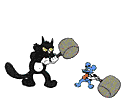I think it's this what gives traditional music (and I use 'traditional' in it's original sense, referring to how it's handed on) it's particular flavour.I.D.10-t wrote:The whole thread made me think of it. Between Dale’s introduction and wombat and your comments, I started to think of modern music and ITM. ITM (and fife music for that matter) amazes me in the fact that in one room there will be children adults and teens all interacting with each other. In modern society it seems that people try to find any chance they can get to drive a wedge between people of different ages. I think that this interaction keeps the music lively.Peter Laban wrote:I am wondering here did my remarks in another thread, the future face of Irish music, prompt this discussion.
I realise it's very hard to bring across what I mean if you haven't actually seen it at work but the whole social interaction, the relations etc is part and parcel of this music. I was afraid I sounded unduly negative in Dale's thread and I didn't want to knock it on the head but what Iheard (in the one track I listened to) was a bunch of kids who put a lot of work into learning the tunes and playing well. But there was also a lot I didn't hear that I do hear in at least some young players here, what I heard was more a 'performance' while the music I am used to is part of something bigger.
A long time ago I quoted an experience here with one of my piping students, she's Brid O Donohue's eldest daughter and has played the whislte since she was 4 (she was 12 at the time). I am teaching her the pipes and at the time I gave her the West Wind, pretty straight forward three aprt reel in G from the playing of Willie Clancy (who in fact is a relation of her). The way it works is I play the tune while the student picks it up by ear. First time around she was picking out the bones, the important notes, filling out the tune as we were going along. She basically had the tune second time around but going through the third part she didn't have it as I had it but filled in around the important notes as she went along what came out was a variation folding back both the melody and the rhythm and it was utterly brilliant, pure music worthy of willie Clancy himself. It knocked my socks off, it was totally wonderful. and above all it was totally unself conscious, in fact she didn't know what she was doing at all, it jsut came out. It's that sort of being inside the music I am referring to, that instinctive understanding of structure and melody that only comes from being around it a very long time while interacting with all sorts of players from all generations.
I can think of other examples, 14 year old Anne Ruth Benagh playing the Dear Irish Boy on the whistle as she learned it from her grandfather Tommy McCarthy, I have seen Edel Fox honing her skills since she was 11 or 12 (twenty two now), Paddy Canny grandchildren and loads and loads more.
I see it in my own son who has a head full of tunes, and if only he'd work at it he could bring them out too. But I remember finding him discussing cocnertinas with Jackie Daly in the local supermarket when he was 8, he goes to Noel Hill for his classes and is comfortable enough to sit down with Kitty Hayes for a tune.
You get the picture, before I ramble on too long. I seem to come back to the same point, learning by example, by absorbtion. I don't think you can beat it in music.
